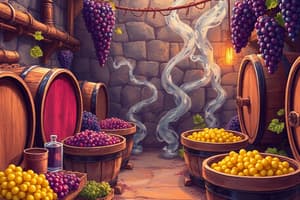Podcast
Questions and Answers
What is the main focus of fermentation in the narrow sense according to Louis Pasteur?
What is the main focus of fermentation in the narrow sense according to Louis Pasteur?
- Anaerobic breakdown of molecules like glucose
- Changes brought about by yeasts and other microorganisms (correct)
- Release of carbon dioxide gas
- Formation of ethyl alcohol and carbon dioxide
What was discovered in the 1920s regarding fermentation reactions?
What was discovered in the 1920s regarding fermentation reactions?
- Yeast is the only microorganism involved in fermentation
- Fermentation reactions are not peculiar to the action of yeast (correct)
- Formation of ethyl alcohol is the only product of fermentation
- Fermentation reactions occur only in the absence of air
What is the main result of the frothing that occurs during the manufacture of wine and beer?
What is the main result of the frothing that occurs during the manufacture of wine and beer?
- Production of muscle extracts
- Evolution of carbon dioxide gas (correct)
- Formation of ethyl alcohol
- Breakdown of glucose into lactate
What did the discovery in the 1920s reveal about glucose utilization?
What did the discovery in the 1920s reveal about glucose utilization?
What is a significant generalization that emerged regarding fermentation reactions?
What is a significant generalization that emerged regarding fermentation reactions?
What did the 17th-century recognition reveal about the frothing during the manufacture of wine and beer?
What did the 17th-century recognition reveal about the frothing during the manufacture of wine and beer?
What is the end product of the anaerobic breakdown of glucose in cells?
What is the end product of the anaerobic breakdown of glucose in cells?
Which pathway is often called the Embden–Meyerhof pathway?
Which pathway is often called the Embden–Meyerhof pathway?
What is the nonionized form of pyruvate?
What is the nonionized form of pyruvate?
What is the role of the tricarboxylic acid cycle?
What is the role of the tricarboxylic acid cycle?
In which absence can pyruvate be reduced to lactic acid, alcohol, or other products?
In which absence can pyruvate be reduced to lactic acid, alcohol, or other products?
Where do most cells' enzymes for fermentation occur?
Where do most cells' enzymes for fermentation occur?
What is an important source of liquid biofuel produced via fermentation?
What is an important source of liquid biofuel produced via fermentation?
Which microorganisms typically initiate industrial fermentation processes?
Which microorganisms typically initiate industrial fermentation processes?
What are some products resulting from yeast fermentation of various sugars?
What are some products resulting from yeast fermentation of various sugars?
Who are the German biochemists after whom the pathway from glucose to pyruvate is named?
Who are the German biochemists after whom the pathway from glucose to pyruvate is named?
Flashcards are hidden until you start studying
Study Notes
Fermentation
- Main focus of fermentation in the narrow sense according to Louis Pasteur: conversion of glucose into ethanol and carbon dioxide
Historical Discoveries
- 1920s discovery: Fermentation reactions involve the breakdown of glucose to pyruvate and further conversion to end products
- 17th-century recognition: Frothing during wine and beer manufacture is due to the release of carbon dioxide
Fermentation Reactions
- Main result of frothing during wine and beer manufacture: release of carbon dioxide
- Discovery in the 1920s revealed: Glucose is utilized through fermentation reactions
Anaerobic Breakdown of Glucose
- End product of anaerobic breakdown of glucose in cells: lactic acid or ethanol and carbon dioxide
- Pathway from glucose to pyruvate often called: Embden–Meyerhof pathway
- Nonionized form of pyruvate: pyruvic acid
Cellular Processes
- Role of the tricarboxylic acid cycle: Aerobic breakdown of glucose
- Pyruvate reduction to lactic acid, alcohol, or other products occurs in the absence of: oxygen
- Location of most cells' enzymes for fermentation: cytoplasm
Industrial Fermentation
- Important source of liquid biofuel produced via fermentation: bioethanol
- Microorganisms that typically initiate industrial fermentation processes: yeast and bacteria
- Products resulting from yeast fermentation of various sugars: ethanol, carbon dioxide, and biomass
- German biochemists after whom the pathway from glucose to pyruvate is named: Embden and Meyerhof
Studying That Suits You
Use AI to generate personalized quizzes and flashcards to suit your learning preferences.




